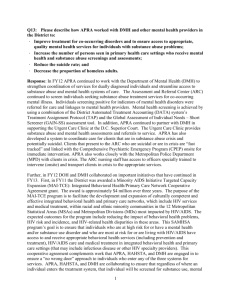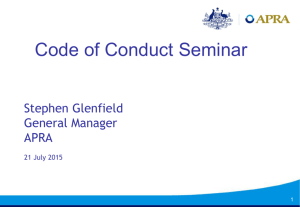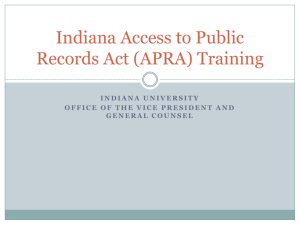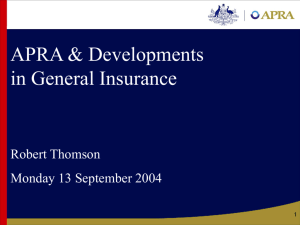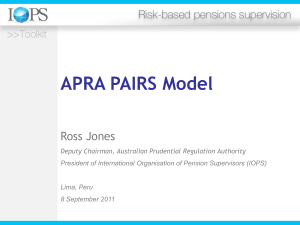Q23: On September 14, 2011, the Office of the Inspect General (OIG
advertisement
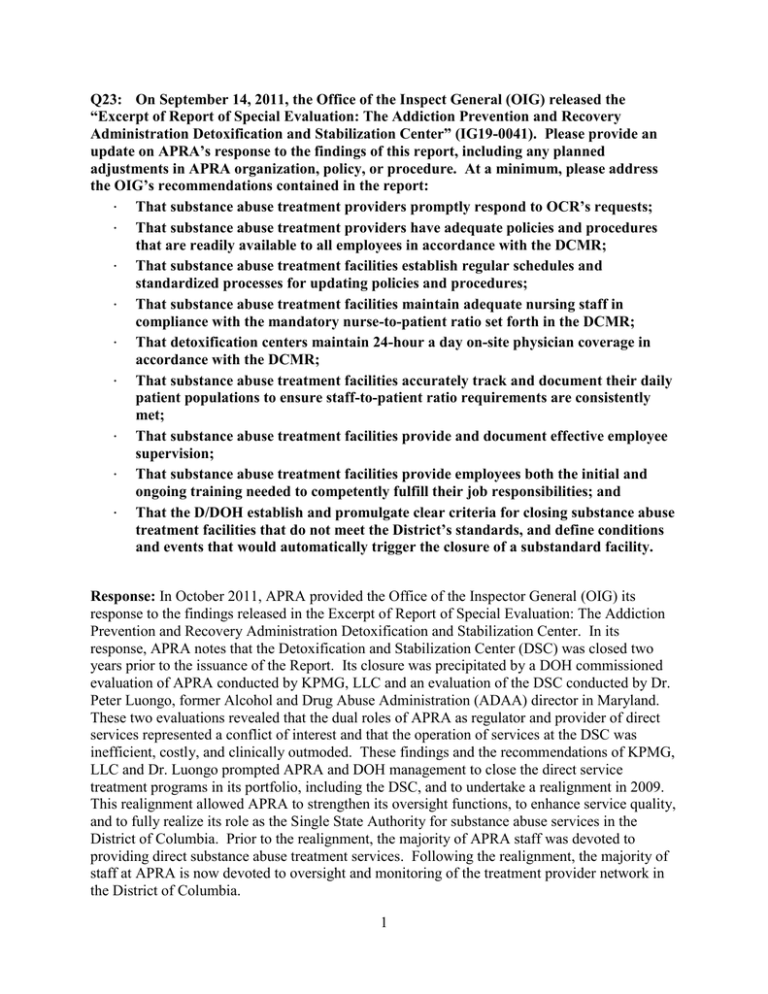
Q23: On September 14, 2011, the Office of the Inspect General (OIG) released the “Excerpt of Report of Special Evaluation: The Addiction Prevention and Recovery Administration Detoxification and Stabilization Center” (IG19-0041). Please provide an update on APRA’s response to the findings of this report, including any planned adjustments in APRA organization, policy, or procedure. At a minimum, please address the OIG’s recommendations contained in the report: That substance abuse treatment providers promptly respond to OCR’s requests; That substance abuse treatment providers have adequate policies and procedures that are readily available to all employees in accordance with the DCMR; That substance abuse treatment facilities establish regular schedules and standardized processes for updating policies and procedures; That substance abuse treatment facilities maintain adequate nursing staff in compliance with the mandatory nurse-to-patient ratio set forth in the DCMR; That detoxification centers maintain 24-hour a day on-site physician coverage in accordance with the DCMR; That substance abuse treatment facilities accurately track and document their daily patient populations to ensure staff-to-patient ratio requirements are consistently met; That substance abuse treatment facilities provide and document effective employee supervision; That substance abuse treatment facilities provide employees both the initial and ongoing training needed to competently fulfill their job responsibilities; and That the D/DOH establish and promulgate clear criteria for closing substance abuse treatment facilities that do not meet the District’s standards, and define conditions and events that would automatically trigger the closure of a substandard facility. Response: In October 2011, APRA provided the Office of the Inspector General (OIG) its response to the findings released in the Excerpt of Report of Special Evaluation: The Addiction Prevention and Recovery Administration Detoxification and Stabilization Center. In its response, APRA notes that the Detoxification and Stabilization Center (DSC) was closed two years prior to the issuance of the Report. Its closure was precipitated by a DOH commissioned evaluation of APRA conducted by KPMG, LLC and an evaluation of the DSC conducted by Dr. Peter Luongo, former Alcohol and Drug Abuse Administration (ADAA) director in Maryland. These two evaluations revealed that the dual roles of APRA as regulator and provider of direct services represented a conflict of interest and that the operation of services at the DSC was inefficient, costly, and clinically outmoded. These findings and the recommendations of KPMG, LLC and Dr. Luongo prompted APRA and DOH management to close the direct service treatment programs in its portfolio, including the DSC, and to undertake a realignment in 2009. This realignment allowed APRA to strengthen its oversight functions, to enhance service quality, and to fully realize its role as the Single State Authority for substance abuse services in the District of Columbia. Prior to the realignment, the majority of APRA staff was devoted to providing direct substance abuse treatment services. Following the realignment, the majority of staff at APRA is now devoted to oversight and monitoring of the treatment provider network in the District of Columbia. 1 Pursuant to the District of Columbia Substance Abuse Treatment and Prevention Act of 1989 ("Act") effective March 15, 1990 (D.C. Law 8-80; D.C. Code § 32-1601 et seq.), a substance abuse treatment program or facility must be certified by the Department of Health in order to operate lawfully in the District of Columbia. Regulations promulgated to enforce the Act include a provision for denial, suspension, or revocation of certification for failure to comply with provisions of the Act, the regulations, and all other applicable provisions of law. See 29 DCMR 2367. In addition to describing criteria for the denial, suspension, or revocation of certification, the regulations also permit the Department to summarily suspend a certification of any facility or program if the Department determines that existing deficiencies constitute an imminent or serious danger to the health, safety or welfare of its patients. DOH/APRA continuously monitors certified substance abuse treatment programs and facilities to ensure compliance with regulatory standards. In addition, DOH/APRA investigates complaints and unusual incidents made against certified treatment programs and facilities. If circumstances exist that meet the criteria in 29 DCMR 2367, DOH/APRA would not hesitate to follow the steps outlined in the DCMR to suspend or revoke a facility’s certification. The Certification and Regulation Division (CRD) is responsible for certifying substance abuse treatment programs and ensuring adherence to the standards within the DCMR. Following the realignment in 2009, APRA implemented several critical changes to the processes and protocols that CRD utilizes to certify and monitor substance abuse treatment providers. APRA now notifies providers of the need to submit an application for recertification 180 days prior to the expiration of the existing certification. APRA also revised the recertification notice to clearly indicate that programs will not be permitted to continue to provide treatment services in the event that the existing certification lapses. This is a change from past agency practice, which permitted programs to continue to provide treatment services after certification lapsed. CRD conducts an inspection of the facility and a review of all policies and procedures during each program’s initial application for certification, the recertification inspection process, and routine follow-up site visits that now occur at each program at least once per year. During these inspections, CRD staff reviews program policies and procedures to ensure that they are being updated on a regular basis and are readily available to all staff, and observes counseling sessions and other activities provided by the program to ensure that they are consistent with applicable DCMR standards and program policies and procedures. The inspection also includes a review of a sample number of personnel folders to ensure that all staff have the appropriate credentials and have received the necessary training and supervision to competently fulfill their job responsibilities. Training and supervision is a major component of the regulations for licensed certified addiction counselors recently implemented by the Department of Health and must be documented in employee personnel folders. APRA has also developed a bulletin system to communicate with providers regarding APRA policy and interpretation of standards within DCMR Title 29, Chapter 23. Utilizing this system APRA has developed a bulletin reiterating and reinforcing the DCMR standards regarding nurseto-patient ratio and the need for 24 hour on-site physician coverage at detoxification facilities. Chapter 23 currently authorizes APRA to summarily suspend the certification of any facility or program if the Department determines that existing deficiencies constitute an imminent or serious danger to the health, safety or welfare of its patients. In addition to APRA’s existing 2 authority to summarily suspend a provider for serious deficiencies, DOH and APRA have drafted a civil penalties rule to apply to Title 29, Chapter 23 of the D.C. Municipal Regulations. At present, DOH/APRA does not have the authority to fine programs determined to be noncompliant with Chapter 23. DOH/APRA finalized the civil penalties rule in FY12 and intends to publish the rule in FY13. 3
